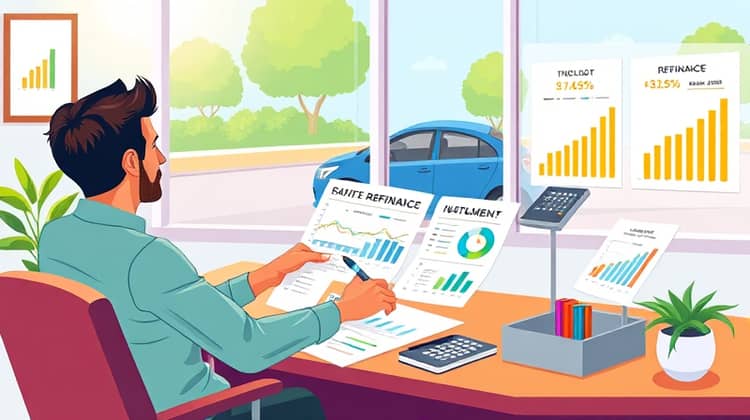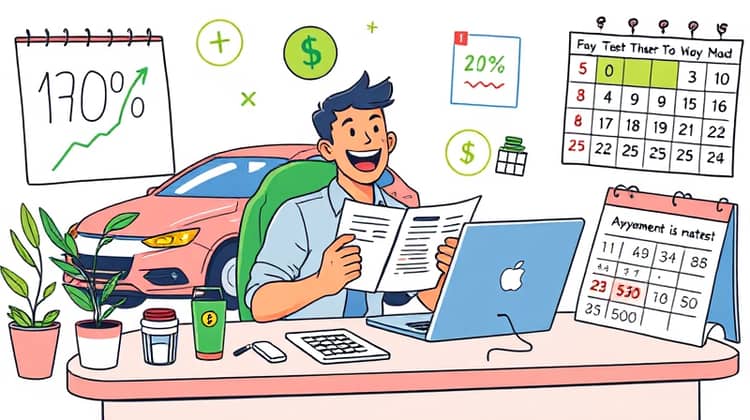Auto Loan Refinancing: Is It Really Worth the Effort?

In the world of auto financing, refinancing has become a popular strategy for borrowers aiming to save money or improve their payment conditions. But is it worth the effort? This article will delve into the nuances of auto loan refinancing, helping you understand its implications, benefits, and drawbacks.
As we navigate through the intricacies of refinancing, we will explore various reasons one might consider refinancing, the step-by-step process of how to refinance, the advantages and disadvantages, and ultimately provide tips for achieving a successful refinancing outcome. After dissecting these areas, you will have a clearer picture of whether refinancing your auto loan aligns with your financial goals.
Understanding Auto Loan Refinancing

Auto loan refinancing is the process of replacing your current auto loan with a new one, typically from a different lender. The primary objective is to secure better terms than those offered in the original agreement. Borrowers often seek lower interest rates, reduced monthly payments, or improved terms overall when deciding to refinance.
In essence, refinancing involves paying off your existing loan with a new loan, ideally one that has more favorable conditions. This financial strategy can be a viable choice for consumers experiencing a change in their financial situation, such as a raise in income, improved credit score, or drops in interest rates since they first obtained their auto loan.
Reasons to Refinance Your Auto Loan

There are several compelling reasons to consider refinancing your auto loan. One of the most common motivations is the possibility of lowering your interest rate. If your credit score has significantly improved since you acquired your original loan or if market interest rates have decreased, you may be eligible for a more favorable interest rate, ultimately reducing your total loan costs.
Another reason for refinancing is to lower monthly payments. This could be accomplished by extending the loan term, which may ease financial strains by making monthly payments smaller, making it easier to budget your finances. However, one must carefully consider the long-term implications of extending the loan duration, such as increased overall interest paid.
- Lowering your monthly payments
- Securing a lower interest rate
- Changing the loan term
- Switching from a variable to a fixed interest rate
- Improving your overall loan conditions
Each of these factors can contribute to a more manageable financial situation, making the prospect of refinancing an appealing option for many borrowers.
The Refinancing Process

The refinancing process begins with assessing your financial status and determining your goals. Collect necessary documentation, such as your current loan statement, a pay stub, and a credit report. Understanding your current financial situation and your credit health is crucial so you can shop around for the best refinancing deal.
Next, you will want to research and compare different lenders. Look for credit unions, banks, and online lenders to find whom offers the best terms. Make sure to get pre-approved with a few lenders to understand the interest rates and terms available to you before making a final decision.
- Review your current loan and finance goals.
- Gather necessary financial documentation.
- Research and compare potential lenders.
- Get pre-approved for best offers.
- Finalize the refinancing with your chosen lender.
Following these steps will streamline your refinancing journey, ensuring that you end up with the most advantageous loan possible.
Pros of Refinancing an Auto Loan

Refinancing an auto loan comes with various advantages that can substantially enhance your financial landscape. One significant pro is the potential for substantial savings on interest payments, especially if your credit score has improved or if you secure a better rate than previously available. This can lead to lower overall costs associated with the loan.
Another advantage is the flexibility in managing monthly payments. Refinancing can allow for reduced monthly installments, which can relieve financial pressure and create additional room in your budget for other expenses or savings.
- Potential savings on interest costs.
- Reduced monthly payments.
- Flexible loan terms to suit financial changes.
- Ability to pay off loans earlier with lower rates.
These pros make refinancing an appealing option for borrowers looking to enhance their financial situations.
Cons of Refinancing an Auto Loan

Despite its advantages, refinancing can also have downsides that borrowers must consider. One significant drawback is the possibility of incurring additional fees during the refinancing process, such as application fees, origination fees, or prepayment penalties on the original loan, which can diminish potential savings.
Additionally, extending the loan term to lower monthly payments may result in a higher total interest paid over the life of the loan, potentially negating the benefits of refinancing.
- Possible fees associated with refinancing.
- Longer loan terms lead to higher overall costs.
- Impact on credit score due to hard inquiries.
- Potential for owing more than the vehicle's worth.
Considering these cons is essential to making an informed decision about whether auto loan refinancing is right for you.
Tips for a Successful Refinancing

To optimize the chances of a successful refinancing experience, borrowers should approach the process with thorough preparation and a solid understanding of their financial needs. Start by reviewing your credit report and fixing any inaccuracies that could impede your refinancing prospects.
Additionally, timing plays a crucial role; monitor interest rates and market trends to identify an opportune moment to refinance your loan for maximum benefit.
- Review and improve your credit score.
- Shop around for multiple lender offers.
- Understand all fees associated with refinancing.
- Choose a loan term that fits your budget.
By following these tips, borrowers can enhance their chances of securing a favorable refinancing deal.
Is Refinancing Worth the Effort?

Ultimately, whether refinancing your auto loan is worth the effort depends on your individual circumstances, financial goals, and market conditions. For those who qualify for lower rates or significantly improved terms, the process can yield considerable benefits and savings.
However, it’s vital to weigh the associated costs, potential long-term implications, and your specific financial situation. Carefully evaluating these factors can help guide you to a well-informed refinancing decision.






